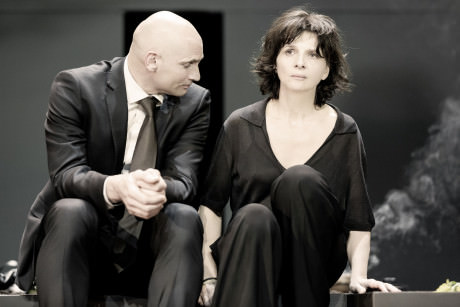Renowned Belgian director Ivo van Hove is famous for his radical re-imagining of classical works, and his rendition Sophocles’ Antigone is no different. Academy Award winner Juliette Binoche stars as the titular character in this excellent new translation by poet and classicist Anne Carson. The text, which tells the story of Antigone’s doomed attempt to give her brother a proper burial despite his being branded as a traitor by her uncle, the ruler Kreon, is both heightened and contemporary. Indeed it is with this spirit that van Hove proceeds in this somber, hallucinatory, and occasionally brilliant staging. It is true that the monk-slow pace and somnolescent sound design can make one a bit drowsy. But the overall effect is not drab; on the contrary, one feels a sense of almost religious mania and, yes, catharsis as one is drawn into the ancient tale of justice and morality. And so even though the trappings are decidedly modern – huge video projections, contemporary costumes and props – this Antigone is in many ways more faithful to the Ancient Greek original, which after all was viewed in a deeply sacred context, than your run-of-the-mill togas and columns production.

This Antigone seems obsessed with how small we mortals are next to the Gods. A titanic screen serves as Scenic Designer Jan Versweyveld’s backdrop under which the cast seems to wilt. And smack in the middle of this vast plane is an enormous disk that inexorably wanes like the moon to reveal a giant sun-shaped hole that lingers over the actors until, at the end, it slowly slides back into place. What was it that Aristotle said about the ideal play taking place in 24 hours? But it isn’t just the sheer size of the backdrop – videos by Tal Yarden depict, in super slow motion, shadowy figures from a modern generic city. And as the palace intrigue rages inside, one gets the sense that Thebes – the people – are just outside the palace gates, mute to their fate and yet bearing the brunt of the decisions being made just inside. Downstage consists of a long, low horizontal line of furniture that both reinforces the enormity of the space and the powerful status of the characters. Made up of a luscious leather sofa and brutally identical books, folders, and desks, the set becomes a stylized Goldman Sachs office that is at once exquisite and terrifying.
If one defining theme of the show is existential inferiority, another is surely the sacred quality of theatre itself. The pace is deliberately slow, and the actors oscillate between a conversational manner of speech and one that is much more priestly. As Antigone, played with depth and (perhaps too much) caution by Juliette Binoche, performs the forbidden burial rites on her brother that sets the whole gory story into motion, one becomes drawn into the ritual itself. The scent of the incense and the low, ominous sound design by Daniel Freitag combine to create an effect that is, well, religious. One scene where Antigone’s sister Ismene, played excellently by Kirsty Bushell, cries out to Bacchus for salvation is nothing less than transcendent. Likewise, the mighty ruler Kreon is given a god-like rendition by Patrick O’Kane whose powerhouse performance is simply humbling.
There is the sense in this Antigone that there is no privacy, that everyone is being watched at all times. The huge open space of the set is always dotted with characters who, in addition to their named role, also each play a member of the Chorus. Unlike a traditional Greek Chorus that speaks in unison, the lines here are delivered by individuals, creating an impression of a modern-day Cabinet of advisors. But even when they are not speaking the actors are arranged like chess pieces around the space. Each scene runs fluidly into the next as the next actor simply picks up his or her line while on stage, creating the sensation that there is no respite from the inexorable path towards tragedy.
The terrific cast is dominated by Juliette Binoche as Antigone, Patrick O’Kane as Kreon, and Kirsty Bushell as Ismene. But the ensemble is rounded out by a slew of wonderful actors, including: Obi Abili, who offers some critical comic relief as the Guard; Samuel Edward-Cook, who plays Antigone’s betrothed Haimon with a down-to-earth authenticity that clashes nicely with his father Kreon’s megalomania; and Tiresius, the blind prophet who ultimately convinces Kreon of the terrible consequences of his decision to execute Antigone, is played with acuity and strength by Finbar Lynch.
This Antigone is experimental in the true sense of the word, because some of its choices work while others do not. But in the end Ivo van Hove should be commended for, as is his raison d’etre, for daring to try. It is a shame that D.C. has to import so much of its avante garde work from Europe – and maybe this production, brief as its run here is, will help to stimulate a local experimental impulse.
Running Time: One hour and forty minutes, with no intermission.
Antigone plays through October 25th at the John F. Kennedy Center for the Performing Arts – 2700 F Street NW, in Washington, DC. For tickets, call the box office at (202) 467-4600, or Toll-Free: (800) 444-1324, or purchase them online.





The Emperor has no clothes. Pretentious yet unintelligible video backdrop. Dull, monochrome staging that made acting seem overwrought. Too often screaming actors who could not be understood. No attempt at character conveyance to audience. Forget about empathy. Thoroughly unenjoyable couple of hours.